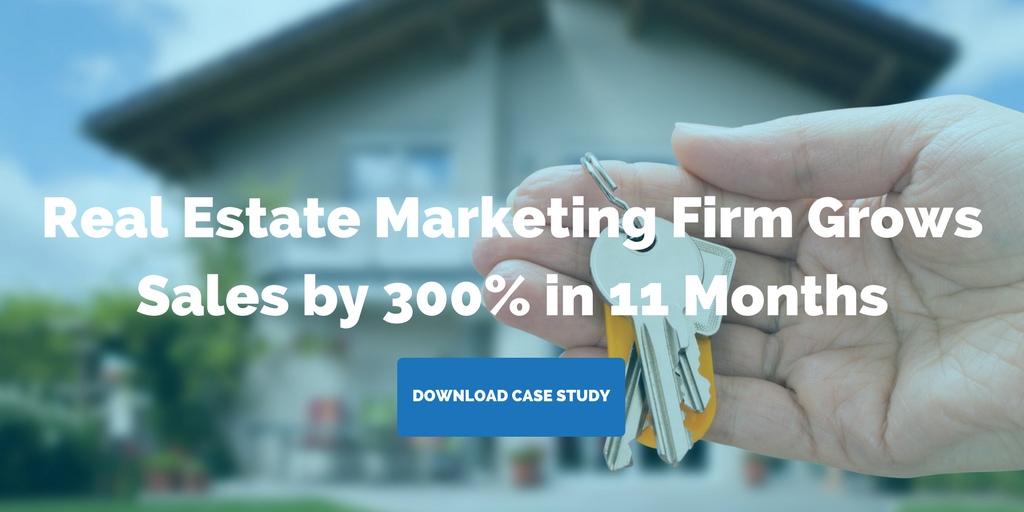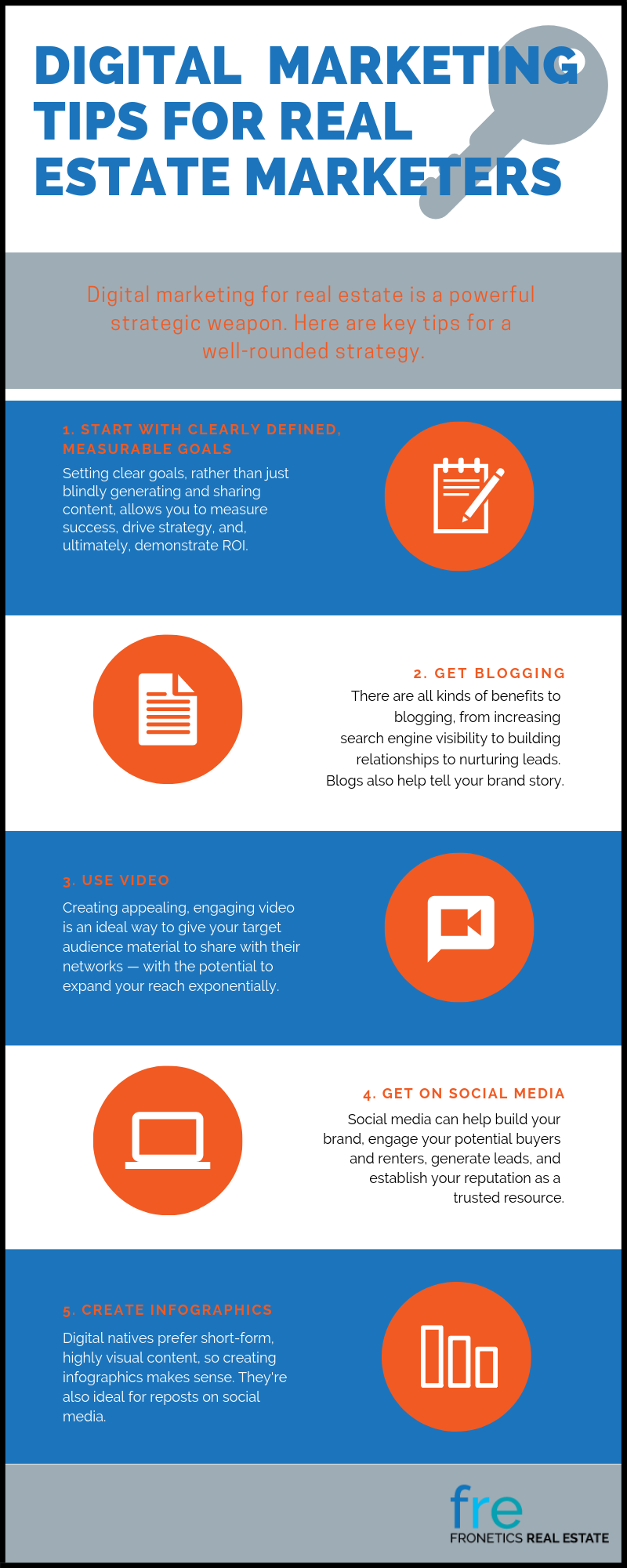Archive for the "Real Estate Marketing" Category

The Role of Social Media in Luxury Real Estate Marketing
In the ultra-competitive field of luxury real estate marketing, social media can be your secret weapon. Here’s how these platforms can help set your brand apart, and drive conversions.
Highlights:
- Social media is an ideal place to create and share your brand narrative.
- With social media usage consistently on the rise, these platforms help lead users to your website.
- The visual nature of social platforms like Facebook and Instagram is ideal for marketing luxury real estate.
Luxury real estate doesn’t exactly sell itself — if you’re a marketer, you’re well aware of this fact! The relatively limited customer base and highly competitive field make it crucial for luxury real estate brands to set themselves and their properties above the pack. When it comes to marketing luxury real estate, social media can be your best friend.
Of course, social media marketing and real estate are a match made in heaven. Real estate is inherently personal, even at the corporate and luxury levels, and marketers can use social media to great effect in cultivating productive relationships with leads. Here are four ways social media can boost your luxury real estate marketing efforts.
4 Ways Social Media Can Help with Luxury Real Estate Marketing
1. Tell the story of your brand
Luxury real estate marketing depends on telling the unique story of your brand — your brand narrative. Social media provides an ideal platform for creating and sharing your brand narrative. Facebook, Instagram, and Twitter are all highly visual networks, perfect for giving your followers and inside look at your authentic luxury brand.
Use photos and videos to show off your luxury properties, and to capture the look and feel of your corporate personality. (If you’re looking for some extra inspiration, these 5 Instagram accounts are killing it at Instagram marketing.) Let your brand’s identity and unique personality shine through in both your visual and written social media content.
2. Cultivate relationships
When it comes to marketing luxury real estate on social media, perhaps the most important, and most often forgotten aspect is the “social.” The amazing thing about these platforms is that they allow marketers not just to share branded content, but to interact with followers, building lasting relationships.
Take advantage of this tremendous opportunity that social media offers. Encourage your followers to engage with you through comments, photo competitions, and questions. When your followers interact with your content, be sure to reply! Go above and beyond by taking the time to interact with content posted by your audience, peer brands, or luxury real estate influencers. Trust us, these small efforts will pay off in a big way.
3. Drive traffic to your website
Used effectively, social media is a great way to drive organic traffic to your website. Consider this: while relatively few people spend time online browsing luxury real estate websites, the average person spends about 135 minutes per day on social media. Like it or not, these platforms are becoming our primary sources for news, socialization, and branded content.
An active social media presence lets you meet your luxury real estate clientele where they are and draw them to your other digital assets. The content you post should be entertaining and engaging, and help guide followers to your website, generating leads and conversions.
4. Boost SEO
Getting people to your website depends largely on search engine optimization (SEO). What many real estate marketers aren’t aware of is that SEO can actually be improved by your social media presence. Yes, the content on your website is critical, but having a well-rounded online presence also factors into search engine algorithms and can help you move towards that coveted top spot.
Sharing your content on social media, for example, helps to build up a network of backlinks, which are one of the top factors that algorithms use to determine search engine rank. Not only that, social media platforms are ideal places to share information about your luxury real estate brand, such as name, address, and phone number. Believe it or not, keeping these simple pieces of information accurate and up to date in multiple locations online strengthens your SEO.
The bottom line
Luxury real estate marketing is a fiercely competitive field, but used effectively, social media offers a key set of tools to set your brand apart. Invest in a strategic social media marketing campaign, and watch your brand awareness, reputation, and conversion rate grow.
Related Posts:
- 5 Real Estate Instagram Accounts You Should be Following
- The Top 3 Social Media Mistakes Real Estate Brands Still Make
- Infographic: Real Estate Social Media Marketing Strategies
Archive for the "Real Estate Marketing" Category

How to Explain Content Marketing ROI to Win (or Keep) Buy-In
Proving content marketing ROI can seem like a daunting task for real estate marketers, but finding and analyzing the right metrics effectively is crucial to measuring ROI, and ensuring buy-in.
Highlights:
- Talking about marketing as if it’s an art rather than a science does a disservice to your department and to your brand as a whole.
- Make sure your executives understand the nature and goals of your marketing strategy.
- The right metrics will help you track ROI, and justify executive buy-in.
Accountability and showing a solid return on investment (ROI) is everything when it comes to ensuring that your business is allocating adequate resources to marketing your brand and properties. And let’s face it, too many executives think that marketing is, at best, about supporting sales or, at worst, a department that exists to paste logos onto coffee mugs.
Writing for Marketo, Content Marketing Specialist Bryson Runser points out that as an “informed marketer, it’s your duty to infuse credibility into your organization by way of meaningful metrics that tie directly to your top and bottom line.” While the C-suite famously cares nothing about internal marketing metrics like Facebook likes or click-through rate, metrics are crucial to the success of marketing real estate. Not only that, effective use of metrics is the best way to establish the function and importance of the marketing department within your organization.
Get your audience on the same page
Before we dive into the nitty-gritty of proving content marketing ROI for the C-suite, it’s important to acknowledge that content marketing hasn’t been around all that long. It’s only in the past decade that the real estate industry has been reshaped by digital and content marketing. This means that you can’t necessarily count on the fact that your organization’s higher-ups understand exactly what content marketing is.
Take the time to make sure your executives understand not only the definition of content marketing, but also how it will help your real estate brand grow and your business achieve various specific goals. Content marketing expert Julia McCoy suggests using approachable metaphors, such as “content marketing is a vehicle, and content marketing strategy is the engine. The vehicle takes you to your destination only if the engine is in good shape.”
Numbers don’t lie
One of the main aspects of the “crisis of accountability” is a problematic view of what marketing is: “if marketing leaders insist that marketing is an art and not a science,” Runser writes,”then the department will remain isolated from other groups.” Establishing that content marketing is not only dependent upon data, but can also be measured, is key to changing that perception.
“Marketing must be able to justify their expenditures as investments in revenue and growth,” writes Runser. Of course, it’s partly a chicken-and-egg issue, since getting to the point of being able to talk about expenditures in this way does require investment from the top of your business.
We know that measuring the impact of content marketing can be tricky. But it’s not impossible. The first step is determining the right metrics to track. For more detailed ideas and analysis, check out this post, which details how to determine and use metrics for real estate marketers to measure the impact of content marketing on brand awareness.
Why are you reporting?
Collecting and reporting on content marketing ROI can feel like you’re spinning your wheels and collecting meaningless data. But it’s crucial to keep metrics focused on the main goal: to enable you and your business to make decisions that improve your marketing efforts. “This is the difference between backward-looking measurement and decision-focused management,” says Runser.
Data for the sake of data doesn’t do any good. Data should be used to shape insights, which in turn informs priorities and actions for your business. We’ve written before about the dangers of vanity metrics, which have no bearing on your bottom line but can give you an inflated sense of success.
It’s very easy to fall into the trap of meaningless data collection, especially when marketers are often struggling to prove their worthiness to the C-suite. But using metrics to improve marketing’s performance will go a long way towards winning over executives. “[B]y aligning data measurements with your company’s strategic objectives,” Runser writes, “it will be easier to allocate resources by revenue impact.”
Related posts:
- What Metrics Should You Track in Real Estate Marketing?
- The Metrics You Should Be Measuring in Real Estate Marketing (Hint: Not Vanity Metrics)
- Social Media Can Be a Strategic Weapon in Real Estate Marketing
Archive for the "Real Estate Marketing" Category

Top 5 Blogs for Real Estate Marketers
Blogs are an ideal source of knowledge and insights for real estate marketing professionals. Here are our favorite five blogs for real estate marketers to follow.
Highlights:
- Up-to-date knowledge is crucial for real estate marketers.
- Following the right blogs sets you up for success and keeps you aware of conversations in the industry.
- These five blogs for real estate marketers are our favorite sources of knowledge and insights.
Promoting your properties, growing your business, converting leads — it’s all about having the knowledge-base that shapes your strategies and solutions. There’s always something new to learn in real estate marketing. We think this makes it an incredibly exciting field — but we also know that it can be equally overwhelming.
If you know where to look, there’s a vibrant conversation going on among real estate marketers as an ever-growing field of ideas is being generated and discussed. We’ve compiled this list of our five favorite blogs for real estate marketers that we think you should be following, too. These are ideal places for information and ideas about overall best practices, social media use, writing effective content, and more.
5 blogs for real estate marketers
1. Propmodo Real Estate
Propmodo Real Estate is the place for cutting-edge insights into how technology is changing the way commercial real estate is acquired, managed, and used. This multimedia site follows people, practices, and tools that are shaping the business of real estate.
A few of our favorite posts include a discussion of the commercial real estate sector’s embrace of lease automation, and “Viral Marketing and Buzz Marketing: What is Better for Real Estate Business?”
2. BombBomb
Like Propmodo, BombBomb’s blog is real estate-specific and dedicated to building relationships through video to create more opportunities in email, text, and social media. It’s particularly strong on email marketing, which is still the most profitable form of marketing online.
We love what BombBomb has to say about the nuts and bolts aspects of real estate marketing, but they also have some great think pieces. For example, a recent post and podcast episode on “Trust, Neuroscience, and the Customer Experience” explored the neuroscience behind trusting relationships with clients, the nature of trust itself, and how to cultivate it.
3. HubSpot Marketing
HubSpot Marketing is a phenomenal resource for all content marketers, including real estate marketers. It covers everything you need to know to become a marketing whiz. Topics include SEO, blogging, social media, lead generation, email marketing, lead management, analytics, and more.
These experts in content marketing may not be writing specifically about real estate, but we have them on the list, since it’s worthwhile for real estate marketers to be aware of the larger ideas and solutions being discussed as it pertains to content marketing.
4. Geek Estate
A good choice for the tech-savvy marketer, Geek Estate focuses on what’s happening in real estate technology — for example, the changes happening with Zillow and Trulia. This is a great resource for being on the cutting-edge of upcoming trends.
Geek Estate is a private community of real estate technologists, innovators, and founders. Much of their content requires a subscription, and membership could be well worth your while. The blog has recently tackled the subject of “Uberizing Real Estate with Zillow Offers.”
5. Social Media Today
Like Hubspot, Social Media Today isn’t specifically focused on real estate. However, it’s a great go-to resource for all things social media, a crucial topic for real estate marketers. The blog frequently features insights from leaders in the field. And SMT’s team of influencers covers topics including social media developments, trending, social marketing, digital strategy, and content marketing.
SMT is a particularly good source of up-to-the-minute news from the social media and larger tech sector. The site keeps closely abreast of the latest developments, and keeps a roundup of social media updates separately archived for easy perusal.
Read them all or pick your favorite — you’ll benefit from increasing your knowledge.
Related Posts:
- Infographic: Real Estate Social Media Marketing Strategies
- A Visual Guide to Social Media Posting Frequency for Real Estate
- Video: Top Real Estate Marketing Trends 2019
Archive for the "Real Estate Marketing" Category

Marketing Automation for Real Estate Marketers is Key to Lead Generation
Real estate marketing is an increasingly complex undertaking. Luckily, marketing automation for real estate is here to help you streamline your efforts.
Highlights:
- Marketing automation tools automate the process of personalizing leads’ interactions with your properties
- Create email workflows, schedule social media posts, and streamline CRM with automation software
Real estate marketing is a massive undertaking, which only grows in complexity as real estate buyers demand more and more personalized experiences throughout the buyer’s journey. Enter marketing automation, featuring a range of solutions for custom lead-nurturing content to all prospects in your database.
The term “marketing automation” describes a variety of tools used to automate the process of personalizing the interactions that your leads have with your properties. Email workflows, social media scheduling tools, and customer relationship management (CRM) are all examples of automated marketing. You can tailor custom email messages based on indicated interests, streamline social media efforts with scheduled posts, evaluate the success of your efforts, and adjust your strategy accordingly.
HubSpot recently reported that businesses using marketing automation to nurture leads received a whopping 451% increase in qualified leads. The same principles apply to marketing automation for real estate. Used correctly, marketing automation software can deliver real-time, personalized messages to prospective buyers and renters at every step of the lead-generation process.
With so many tools and insights available, it’s easy to get overwhelmed. Here’s our guide to what you need to know about marketing automation for real estate.
Marketing automation for real estate: Email workflows
Having a segmented email list — sorted by when a prospect joins the list, what emails they’ve opened, their demographics, etc. — is key to creating effective email workflows. With a quality list, you can ensure you’re sending the most relevant information to your prospects, keeping them invested (and keeping you out of their spam folder).
The first step is setting up a template; once you do that, you can plug in your content, manage your contact list, and schedule your emails in advance.
Our favorite tools for email workflows
1. Customer.io
This tool lets you send targeted messages to your prospects, crafting them based on how they interact with your property, and making personalized messages simple. You can also keep track of conversions and create customer profiles. Our favorite part? It integrates with your mobile app or website, letting you see data in real time and trigger actions by adding in predefined rules.
2. Constant Contact
This powerful tool has some features that are unique — and can take your marketing capabilities beyond the basics. Beyond setting up and managing an automated database, Constant Contact offers Facebook fan promotion, coupons and deals, and event management.
Social media scheduling
Keeping your posts on multiple platforms up to date, consistent, and engaging can be a major time drain. Automating your social media marketing efforts lets you plan ahead and schedule updates on some or all of your social media channels, and lets you easily strategize about peak posting times.
Our favorite tools for social media scheduling: AdRoll
AdRoll is an extremely effective tool for retargeting prospects through re-engagement on Facebook, Twitter, and elsewhere on the web. It offers cross-device and cross-platform retargeting capabilities, as well as flexible segmentation, letting you provide customized experiences that dramatically improve your marketing efficiency. It also offers customized budgeting and full control over ad spend.
Customer Relationship Management (CRM)
Converting website visitors to leads is always the goal, but it often comes with a back-breaking load of time-consuming labor. The right software lets you move your prospect through the sales funnel automatically, sending emails to educate them on the next steps, and scheduling them for viewings.
Our favorite tools for CRM
1. Pardot
Pardot is an all-inclusive marketing automation suite, but it’s particularly strong for amping up your engagement with CRM integration. It’s a great tool for helping your sales team shorten the sales cycle. And, in addition to CRM integration, it offers email marketing, lead nurturing, lead scoring, and ROI reporting.
2. Marketo
This cloud-based marketing software lets you drive revenue with lead management and mobile marketing. It not only helps build prospect relationships, but it helps you sustain them as well. Best of all, you can try it out for free until you’re sure it’s right for your company.
Select one or more of these tools, study them carefully, and get to work. Eventually, marketing automation for real estate will become second nature, save you time, and, most importantly, generate solid leads.
Related Posts:
- Our 6 Favorite Marketing Automation Tools for Real Estate Marketers
- 5 Marketing Automation Ideas for Real Estate
- Social Media Can Be a Strategic Weapon in Real Estate Marketing
Archive for the "Real Estate Marketing" Category

Infographic: 5 Tips to Make Digital Marketing for Real Estate Count
Digital marketing for real estate is a powerful strategic weapon. Our infographic gives you some key tips for a well-rounded strategy.
Highlights:
- 88% of all home buyers use the internet to collect information, and for 43%, an online search is their first step.
- When you kick off digital marketing for real estate, setting clear goals, rather than just blindly generating and sharing content, allows you to measure success, drive strategy, and ultimately, demonstrate ROI.
- Video is an ideal way to give your target audience material to share with their networks — with the potential to expand your reach exponentially.
As the realm of marketing has undergone a seismic shift in the past decade, digital marketing for real estate has taken off. According to the National Association of Realtors, 88% of all home buyers use the internet to collect information, and for 43%, an online search is their first step. Real estate marketers are increasingly targeting their efforts on digital media, and content marketing is one of the best ways to do this.
Our infographic below represents our favorite digital marketing tips for real estate marketers. Read on for ways you can use this powerhouse tool to market your brand and properties.
Digital marketing for real estate — 5 tips
1) Start with clearly defined, measurable goals
Effectively selling or leasing property requires a comprehensive, data-driven approach to marketing — which means starting with clearly defined, measurable goals. Are you looking to generate more leads? Raise brand awareness? Grow your social media presence? When you kick off digital marketing for real estate, setting clear goals, rather than just blindly generating and sharing content, allows you to measure success, drive strategy, and ultimately, demonstrate ROI.
2) Get blogging
Blogs help you sell real estate. Period. There are all kinds of benefits to blogging, from increasing search engine visibility to building relationships to nurturing leads. The more you publish, the higher you’ll rank with search engines. And every time you publish a blog post, you increase the chances that a user searching online for real estate will find your website.
Blogs also help tell your brand story. They help buyers imagine themselves in your space. They nurture leads and build trust among potential buyers. In a recent audit of a client’s website, we found that people who read the blog converted at an almost 30% higher rate than other web traffic. That’s significant.
3) Use video
If you’re a frequent reader of our blog, you’ll know that we’ve been writing about the astronomical rise of video in real estate marketing for a while now. We can’t stress it enough: video is here to stay, and it’s time your business starts embracing it as a highly effective content marketing tool.
Part of what makes video such an appealing form of content is its inherent shareability, which drives organic traffic. Getting your content and properties out to your base audience is one thing but empowering that audience to be your ambassadors is a huge next step. Creating appealing, engaging video is an ideal way to give your target audience material to share with their networks — with the potential to expand your reach exponentially.
4) Get on social media
Real estate is a people business. That’s why you should leverage a marketing tool that is also all about people: social media. If you have not begun developing social media strategies for your real estate business, now is the time to get started.
Consider for a minute that in 2017, 81% of Americans had at least one social media profile. And the numbers are projected to continue skyrocketing: by 2020, 200 million people just in the U.S. are estimated to be on social media. Used wisely, social media can help build your brand, engage your potential buyers and renters, generate leads, and establish your reputation as a trusted resource.
5) Create Infographics
Infographics can be one of the most effective mediums for digital marketing for real estate. We know that digital natives, who make up the majority of real estate buyers today, prefer short-form, highly visual content. So, infographics make a lot of sense when it comes to speaking their language. Infographics are also prime candidates for reposts on social media.
Since the text in infographics isn’t readable by search engines, you can make the most out of your content and bump up your SEO by including a transcript of your text with your graphic, ideally at least 350 words.
Final thoughts
Online searches have changed real estate marketing for good. In fact, the possibilities that digital marketing offers are varied, constantly evolving, and exciting. Savvy real estate marketers are using quality content to raise brand awareness, improve SEO, build relationships, and generate leads.
Related Posts:
- A Visual Guide to Social Media Posting Frequency for Real Estate
- 10 Social Media Statistics for Real Estate Marketers 2018
- 10 Quick Ways to Grow Brand Awareness
Archive for the "Real Estate Marketing" Category

How to Use Instagram for Real Estate Marketing
Instagram is a natural fit for real estate. Here’s what you need to know about using Instagram for real estate marketing.
Highlights:
- Instagram content needs to be consistent in tone and timing, visually appealing and engaging.
- Instagram Stories and Highlights are ideal ways for real estate marketers to give users a look into their brand.
- Hashtags promote engagement and raise brand awareness.
With its highly visual platform, robust Stories feature, and growing user base, Instagram is a natural fit for real estate marketing. The platform boasts over 500 million users and 4.2 billion likes per month. Used strategically, it’s an ideal place to showcase your properties and brand.
Real estate marketers should be aware that Instagram requires a different content and posting strategy from Facebook, Twitter, LinkedIn, or other social media platforms. For example, engagement on Instagram is ten times higher than it is for Facebook, and the demographic is substantially more affluent — making it a no-brainer for luxury real estate.
In general, marketers have been relatively slow to adopt Instagram for real estate marketing, a puzzling reality given its overall popularity and natural fit for the visual nature of real estate. But savvy marketers, like these five real estate accounts for example, have figured out how to use this platform to great success.
Instagram for real estate marketing — the right kind of content
Instagram is a fantastic platform for engaging users. But to get the most out of it, it’s important for real estate marketers to post the right kind of content. Obviously, Instagram is a highly visual medium. It lends itself to beautiful, arresting images, and pitchy hashtags.
Keep your content and visual style consistent. Your profile is your calling card on the platform and should reflect the overall tone you want to set for your brand. This also means posting content at a consistent rate, ideally 2-3 times a day.
Chances are, you’ve had fun playing with Instagram filters. But you may not know that certain lighting and color presets perform better than others. According to Iconosquare, the most popular filters currently on Instagram include Clarendon, Juno, Lark, and Ludwig — and they really do have an impact on engagement.
In order to determine the best types of content to engage your target audience, keep an eye on your competitor and peer brands’ presence on the platform. You can also make use of Instagram analytics tools to track, analyze, and benchmark your Instagram content.
Instagram Stories and Highlights
When the feature was first introduced, Instagram Stories was a gamechanger for the ways in which users interact on social media. Stories are sequences of content that users post to their Instagram accounts over a 24-hour period. Besides photos, Stories can include videos, live and prerecorded, as well as Boomerangs, seconds-long motion clips that play forward and backward.
Stories can also be customized with various design tools, including stickers and filters. Notably for real estate marketers, these tools include location tags, as well as time, weather, or holiday greetings. Audiences can view the Stories of the users they follow within the 24-hour window after they are posted. They can find users with active Stories by scrolling the user icons at the top of the app. Or users can tell their followers that they’ve posted a story by tagging them, which notifies them through a direct message.
For brands, Stories offer the invaluable feature of having metrics wrapped into the experience. The feature allows you to track not only how many views your story has received, but exactly which users have viewed it, and how they interacted with it.
In addition to its Stories feature, Instagram now lets users create a featured group of “Highlights” in various categories on their profile. Stories have only a 24-hour lifespan, so featuring your most effective Stories clips in Highlights gives them a second life, and a chance to engage future followers.
Hashtags
One of the most effective ways to grow your Instagram following is to use hashtags effectively. Since Instagram gives users the ability to follow hashtags that interest them, and they function as links to other relevant content, choosing the right hashtags is the ideal way to reach and engage your target audience.
Keep an eye on accounts of peer brands, to stay up to date with the best hashtags to be using. The most effective hashtags are short, memorable, and easy to read. You can also use a free online tool like InconoSquare or Websta to find relevant hashtags for the real estate industry. For much more, check out our guide to using hashtags for real estate marketing.
If you want engagement, engage
It’s easy to forget that the fundamental benefit of social media is that it’s social. Users want to be part of a conversation. Encourage your followers to interact with you on all your social media platforms, including Instagram. This means responding to comments and brand mentions, as well as engaging with your followers’ content.
Starting and fostering a conversation with your followers and peer brands on Instagram is a key to getting the most out of this platform. Encouraging interaction helps drive brand awareness, and lead generation for your properties. Now, the time has come for you to master Instagram for real estate marketing.
Related Posts




